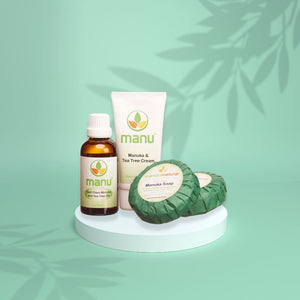A Natural Remedy for Modern Ailments
In recent years, Manuka honey has garnered attention beyond the culinary world, earning its place as a powerful natural remedy with diverse therapeutic effects. This honey, derived from the nectar of the Manuka tree (Leptospermum scoparium) native to New Zealand and parts of Australia, is celebrated not just for its rich flavor but for its unique medicinal properties that set it apart from regular honey.
What Makes Manuka Honey Unique?
Manuka honey’s therapeutic potential is largely attributed to its high concentration of methylglyoxal (MGO), a compound that gives it powerful antibacterial properties. While all honey has some level of hydrogen peroxide, which contributes to its antimicrobial effects, Manuka honey contains additional non-peroxide activity, making it particularly potent in combating bacteria and healing wounds. The Unique Manuka Factor (UMF) grading system is used to measure the potency of Manuka honey, with higher UMF ratings indicating stronger antibacterial activity.

Therapeutic Benefits of Manuka Honey
Wound Healing and Skin Care:
One of the most well-documented uses of Manuka honey is in wound care. Its antibacterial properties help prevent infection, while its anti-inflammatory effects reduce swelling and promote healing. Clinical studies have shown that Manuka honey can accelerate the healing of burns, ulcers, and surgical wounds. It creates a moist healing environment that can prevent scarring and improve tissue regeneration. Moreover, Manuka honey's ability to draw moisture into the skin makes it an effective treatment for conditions like eczema and acne, helping to soothe irritation and reduce breakouts.
Antibacterial and Antimicrobial Properties:
Manuka honey is effective against a broad spectrum of bacteria, including antibiotic-resistant strains like MRSA (Methicillin-resistant Staphylococcus aureus). The honey’s high MGO content disrupts bacterial growth, making it a valuable alternative in the fight against infections. In addition to its use on wounds, Manuka honey has been used in medical settings as a topical treatment for bacterial infections, particularly where conventional antibiotics have failed.

Digestive Health:
Regular consumption of Manuka honey has been shown to promote gut health by balancing the gut microbiome. It can help alleviate symptoms of digestive disorders such as irritable bowel syndrome (IBS), acid reflux, and gastric ulcers. Manuka honey’s antibacterial properties are believed to combat Helicobacter pylori, a bacteria linked to stomach ulcers. Additionally, its prebiotic qualities encourage the growth of beneficial gut bacteria, supporting overall digestive health.
Anti-inflammatory and Immune Support:
Beyond its antibacterial properties, Manuka honey also has significant anti-inflammatory effects. These can be beneficial for reducing inflammation associated with a variety of conditions, from arthritis to sore throats. When taken orally, Manuka honey can soothe throat inflammation and reduce the severity of coughs and colds. Its antioxidant content further supports immune function by neutralizing harmful free radicals in the body.
Oral Health:
Manuka honey’s ability to combat harmful bacteria makes it a natural remedy for maintaining oral health. It can help reduce plaque formation, prevent gingivitis, and soothe periodontal disease. Unlike regular sugars, the natural sugars in Manuka honey do not contribute to tooth decay, making it a safe and effective alternative to traditional sweeteners in oral care products.
Improved Sleep and Relaxation:
Consuming a small amount of Manuka honey before bed has been linked to improved sleep quality. The honey’s natural sugars raise insulin levels slightly, allowing the amino acid tryptophan to enter the brain more easily, where it is converted into serotonin and then melatonin, promoting relaxation and sleep.

Incorporating Manuka Honey into Your Routine
To reap the therapeutic benefits of Manuka honey, it is important to choose a product with a high UMF rating. A UMF rating of 10 or higher is recommended for medicinal use, while lower ratings are suitable for general consumption.
Manuka honey can be applied topically to wounds, mixed with warm water or tea for soothing sore throats, or taken by the spoonful for digestive health. It can also be incorporated into skincare routines as a natural moisturizer or antibacterial treatment.
Conclusion
Manuka honey is more than just a natural sweetener; it is a potent therapeutic agent with a wide range of health benefits. From healing wounds and fighting infections to improving digestive health and supporting the immune system, Manuka honey’s unique properties make it a valuable addition to both traditional and modern medicine. As research continues to uncover the full extent of its benefits, Manuka honey remains a shining example of nature’s ability to heal and protect.




发表评论